The Twilight Zone: Season 4 Blu-ray Movie
HomeThe Twilight Zone: Season 4 Blu-ray Movie 
Image Entertainment | 1963 | 935 min | Rated TV-PG | May 17, 2011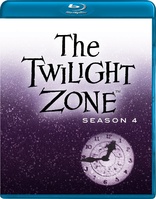
Movie rating
9.1 | / 10 |
Blu-ray rating
| Users | 4.5 | |
| Reviewer | 4.0 | |
| Overall | 4.2 |
Overview
The Twilight Zone: Season 4 (1963)
The complete fourth season of Rod Serling's classic, groundbreaking series exploring the fantastic and the frightening.
Starring: Jack Klugman, William Shatner, Robert Redford, William Windom, Cliff RobertsonDirector: John Brahm, Douglas Heyes, Buzz Kulik, Lamont Johnson (I), Richard L. Bare
| Horror | Uncertain |
| Psychological thriller | Uncertain |
| Supernatural | Uncertain |
| Mystery | Uncertain |
| Sci-Fi | Uncertain |
| Thriller | Uncertain |
Specifications
Video
Video codec: MPEG-4 AVC
Video resolution: 1080p
Aspect ratio: 1.33:1
Original aspect ratio: 1.33:1
Audio
English: LPCM 2.0 Mono (48kHz, 16-bit)
English: LPCM 2.0 Mono (48kHz, 16-bit)
1st 2.0 Mono is Remastered Audio, 2nd is Original Audio
Subtitles
English SDH
Discs
50GB Blu-ray Disc
Five-disc set (5 BDs)
Packaging
Slipcover in original pressing
Playback
Region A (locked)
Review
Rating summary
| Movie | 4.0 | |
| Video | 4.5 | |
| Audio | 4.5 | |
| Extras | 4.0 | |
| Overall | 4.0 |
The Twilight Zone: Season 4 Blu-ray Movie Review
Yet another dimension of sight and sound on Blu-ray.
Reviewed by Casey Broadwater May 5, 2011Socially conscientious sci-fi. Fable-like fantasy. Morality tale horror and suspense predicated on the fears and cultural concerns of America in the 1960s. The Twilight Zone wasn’t just a TV program; it was and is a crash course in sociology, taught by creator Rod Serling, whose ideas about progress, technology, materialism, and human nature set the show apart from other now-forgotten relics of television’s golden age. With its influence felt in Twin Peaks and The X-Files, Lost and Fringe, The Twilight Zone might as well be listed in the dictionary as an example of “seminal,” and it holds up today as a show that’s both shocking and smart. Over the past few months, Image Entertainment has re- released the first three seasons of the series in beautiful, comprehensive Blu-ray editions, and this new 5-disc season four set is just as stunning, with pristine high definition transfers of the show’s original 35mm negatives, lossless audio, and hours of bonus materials. The first two seasons are the best, but season four has its share of thought-provoking, occasionally terrifying episodes. If you’re a retro TV fan, sci-fi enthusiast, or all-around aficionado of the strange, The Twilight Zone belongs on your Blu-ray shelf.
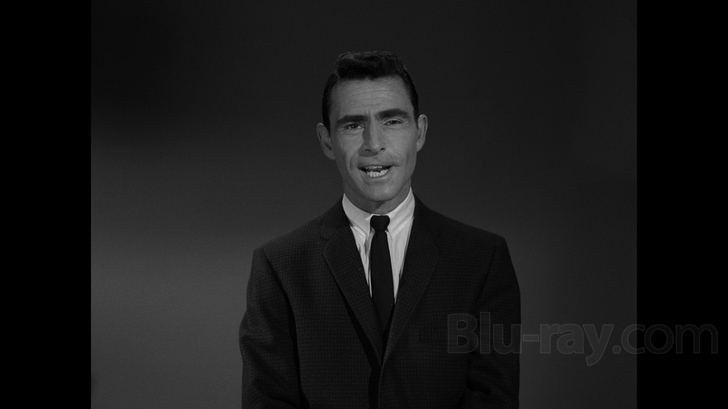
As always, Rod Serling presents...
“You unlock this door with the key of imagination. Beyond it is another dimension, a dimension of sound, a dimension of sight, a dimension of mind. You're moving into a land of both shadow and substance, of things and ideas. You've crossed over into…The Twilight Zone.”
By the end of The Twilight Zone’s third season, you might say that creator, showrunner, producer, narrator, and lead writer Rod Serling was increasingly prone to misplacing his figurative key of imagination. After personally writing sixty-nine of the show’s one hundred and two episodes to date, Serling was inevitably running short on fresh ideas, and many of his season three episodes were basically loose thematic remakes of his best work from the first two seasons. I imagine he was both disappointed and relieved when CBS dropped The Twilight Zone from its fall 1962 line-up after the show was late finding a new sponsor. It was replaced—somewhat ironically—by a show called Fair Exchange, an hour-long sitcom that, by mid-season, had failed to find a substantial audience, prompting network execs to rethink their Twilight Zone strategy. Serling, now teaching at Antioch College, was notified that his show would return in January of 1963, albeit with a major revision: to fit the vacant timeslot left by the cancelled Fair Exchange, the normally half-hour Twilight Zone would have to go to an hour-long format. Serling wasn’t pleased. “Ours is the perfect half-hour show,” he said. “If we went to an hour, we'd have to fleshen our stories, soap opera style. Viewers could watch fifteen minutes without knowing whether they were in a Twilight Zone or Desilu Playhouse.” He had a point. Previous seasons relied on short story-style narratives with quick hooks and snappy, O. Henry-esque twist endings. Going to an hour would require a significant expansion of each episode’s mid section, and—at the risk of a cheesy rhyme—a show that’s billed as a thriller shouldn’t have any filler.
Nonetheless, season four—on the whole—is arguably a stronger collection of stories than season three, which had entire episodes of fluff. Sure, there are a few season four shows that languish during a saggy second act—“The Thirty-Fathom Grave” and “Passage on the Lady Anne” come to mind, both nautically-themed, incidentally—but there are several episodes here that rival anything from seasons one and two. Serling wisely cut back on his input, contributing only seven screenplays—still more than any other writer—while frequent collaborator Charles Beaumont picked up some of the slack, despite suffering with the beginning stages of both Alzheimer’s and Pick’s disease. Beaumont’s episodes are some of the most memorable of the season. His opener, “In His Image,” is a slow-burning mystery about an out-of-control android who, after realizing that he isn’t human, confronts his identical maker. In “Miniature,” a young Robert Duvall plays a socially stunted thirty-year-old virgin who falls in love with the tiny inhabitant of a museum dollhouse, and prolific actor Burgess Meredith makes his fourth and final Twilight Zone appearance in “Printer’s Devil” as a typesetter and journalist of Faustian disposition. These are all sharply written and make good use of the show’s new hour-long format. Beaumont also gets credit for the scariest episode of the season, “The New Exhibit,” which follows the descent into madness of a man who keeps wax figures of history’s most notorious serial killers in his basement. There are two big “BOO” moments here that, if you’re in the right frame of mind, have the potential to give you involuntary palpitations.
Although I Am Legend author Richard Matheson only delivered two teleplays this season, they’re two of the best. “Mute” asks a provocative question: Would a speechless-but-telepathic orphan be better off in life if she abandoned her gift and became “exactly like everybody else,” as her oppressive schoolteacher demands? Better yet is “Death Ship,” which explores themes of control and acceptance when three astronauts—one played by Jack Klugman—land on a remote planet, only to find a crashed duplicate of their ship, with their own dead, doppelganger bodies inside. This is a haunting, almost surreal episode, and it features moody cinematography and a great special effects shot of the spacecraft touching down on the surface of the planet. Like the greatest Twilight Zone stories, it uses a fantastical situation to demonstrate the weaknesses of human behavior.
Of course, for Rod Serling, the show was a means to side-skirt TV censors, using science fiction and fantasy—genres for kids, supposedly—to discuss otherwise unbroachable topics like racism, Cold War paranoia, and uncertainty in the merits of so-called progress. While Serling’s episodes in season four are an undeniably mixed bag, they serve to summarize his thematic preoccupations. “He’s Alive” stars Dennis Hopper as a neo-Nazi firebrand who receives inspiration from the shadowy ghost of Hitler, and using this set-up, Serling somehow manages to make us feel sympathy for an unrepentant racist and illuminate the combination of misguided anger and poor logic that comprise his hateful ideology. While America was rushing headlong into the space race, Serling also seemed unconvinced that technology would solve mankind’s problems. He penned numerous episodes about space travel gone awry, and although “The Parallel” is one of the lesser ones—it’s about an astronaut who discovers a portal to an alternate universe—it does have a few creepy moments. (It reminds me of a predecessor to the “Deep Throat” episode of The X-Files, which deals with a test pilot who no longer seems to be himself.)
Inevitably, this distrust in technology and the worship of progress manifests itself in episodes about the longing to go back to simpler times, like “Of Late I Think of Cliffordsville,” and “No Time Like the Past,” in which one of the characters—a time traveler—describes the modern world as a “cesspool, a septic tank,” run by “scientifically advanced monkeys.” This is the most quintessentially “Serling” episode of the season, using time travel to express the writer’s sometimes misanthropic cultural criticisms. An interesting counter to this, however, is his episode “On Thursday We Leave for Home,” about a group of humans who have been stranded on a barren planet for thirty years. When rescue finally arrives, the leader of the castaways—aware that he’s about to lose his god-like power—tries to keep his people from boarding the spaceship that will take them back by telling them that “there is violence on the Earth! There are hatreds! And jealousy!” The captain of the rescue craft responds that the Earth “isn’t a place of all beauty. We may yet have wars. And there still remains prejudice. And I suppose as long as men walk, there’ll be angry men, jealous men, unforgiving men. But it has one thing that you don’t have. One thing. It lets every man be his own master.” This might as well be Serling’s own admission that while our world may not be perfect, and although the survival of our species is often endangered by our collective poor decisions, we at least have a choice, and wherever there is choice there is always the possibility of hope and change for the better.
The Twilight Zone: Season 4 Blu-ray Movie, Video Quality 
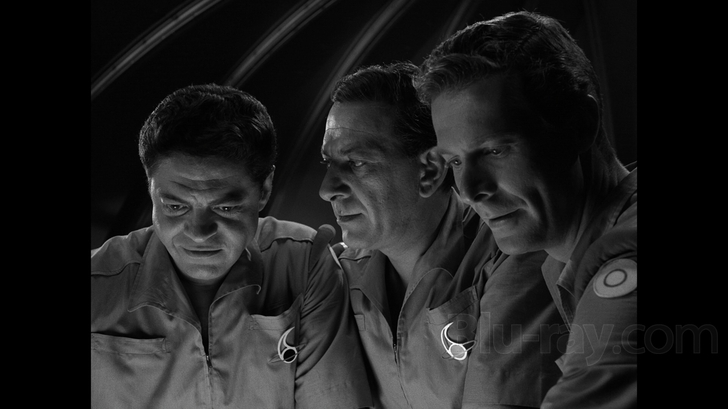
If you've been following our reviews for seasons one, two, and three, you'll find nothing significantly different about the picture quality for season four, and that's a good thing. It would be nearly impossible to improve on the fantastic work Image Entertainment has done with these Blu-ray season sets. Quite simply, after fuzzy analog TV broadcasts, blurry VHS tapes, and good-but-not-great DVD releases, this is The Twilight Zone as you've never seen it before. Using original 35mm negatives, all-new 1080p/AVC-encoded transfers have been struck for each hour-long episode—framed in the standard 1.33:1 TV aspect ratio—and the results are unanimously gorgeous. As I mentioned in the previous reviews, I'm not sure if the source materials were near-pristine to begin with, or if these new masters required extensive restoration work, but regardless, the prints display no damage whatsoever and no substantial debris aside from a few scattered white specks. (They're also untouched by DNR. The grain structure is rich and stable.) Season four displays the same level of exemplary clarity as its predecessors, revealing details that you've probably never noticed before. This is a somewhat negative example, but the high definition image is so crisp that it makes the aging make-up in "Of Late I Think of Cliffordsville" look ridiculous. The show's producers probably never expected that it would ever be watched at home at nearly full analog film resolution. The textures of the actors' faces, the fibers of Rod Serling's herringbone suits, the details of the props—everything is refined and clear, without showing any signs of edge enhancement. Just as importantly, inky blanks, bright but not overblown whites, and a smooth gradient of a gray tones come together for an image with real depth and presence. I'm impressed anew every time I pop one of these discs in my Blu-ray player.
The Twilight Zone: Season 4 Blu-ray Movie, Audio Quality 
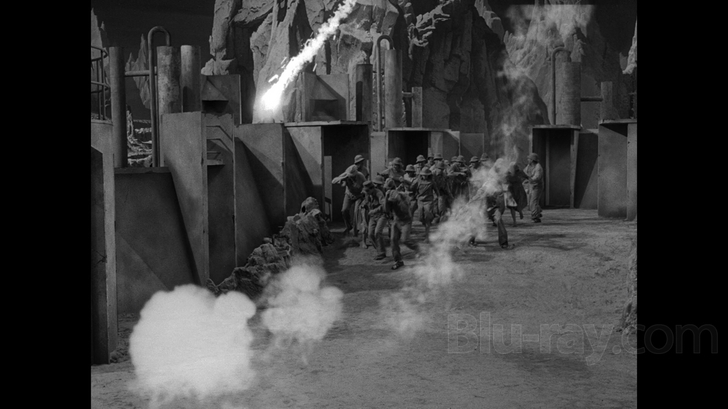
Continuing the custom established in the previous three seasons, there are two audio options for each episode of season four, both sourced from the original magnetic soundtracks. Each episode defaults to a newly restored and remastered Linear PCM 2.0 mix that has been digitally cleaned up and optimized. The results are solid; the dialogue is perfectly reproduced, the various sound effects are clean and even dynamically punchy on occasion, and the scores—where the audio really shows its muscle—sound wonderful. For comparison, you can also select the original, unmastered audio, which is a bit murkier, with slightly muffled dialogue at times and a low tape hiss that can be made out if you listen carefully. The remastered mixes are preferable in my opinion, but it's commendable that Image thought to include the untouched audio as well. Each episode also includes white, easy-to-read English SDH subtitles, which are aligned with the lower left corner of picture.
The Twilight Zone: Season 4 Blu-ray Movie, Special Features and Extras 
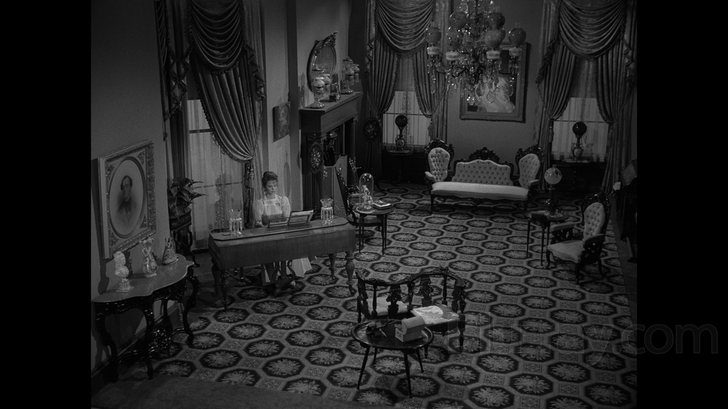
Once again, Image has delivered a comprehensive package of supplements, anchored by fifteen commentary tracks--thirteen of them specifically
commissioned for this Blu-ray set--from The Twilight Zone Companion author Marc Scott Zicree, TV/Film historian Gary Gerani, and a variety
of other guests, including Twilight Zone writer Earl Hamner, Logan's Run writer William F. Nolan, Fringe and Battlestar
Galactica writer/producer Joseph Dougherty, and more. You'll also find vintage audio recollections, video interviews, sponsor billboards, isolated
scores for all eighteen episodes—presented in Dolby Digital 2.0—and some bonus ephemera on the fifth disc. Do note that the previews for "Next
Week's Show" are automatically tagged to the end of each episode. Here's a full breakdown of everything that's featured:
#103 In His Image
- Commentary by Marc Scott Zicree
- Zicree Interview: Herbert Hirschman, 1978 (52:11)
- Isolated Score
- Sponser Billboards (00:17)
- Commentary by Gary Gerani and Marc Scott Zicree
- Isolated Score
- Sponsor Billboard
- Radio Drama starring Blair Underwood (44:14)
- Interview with Morgan Brittany (SD, 7:24): Former child actor Morgan Brittany talks about her experiences on The Twilight Zone.
- Isolated Score
- Sponsor Billboard
- Rod Serling Blooper (SD, 00:12): Serling hilariously fudges his opening narration.
- Isolated Score
- Sponsor Billboards
- Isolated Score by Fred Steiner
- Sponsor Billboards
- Commentary by Marc Scott Zicree
- Zicree Interview: Ross Martin (52:04)
- Isolated Score
- Sponsor Billboards
- Interview with Anne Francis (SD, 8:11)
- Commentary by Earl Hamner and Marc Scott Zicree
- Zicree Interview: Earl Hamner, Buzz Kulik, Anne Francis (52:11)
- Isolated Score by Van Cleave
- Sponsor Billboards
- Commentary by William Windom
- Commentary by William F. Nolan and Marc Scott Zicree
- Isolated Score by Fred Steiner
- Sponsor Billboards
- Commentary by Bill Warren and Marc Scott Zicree
- Zicree Interview: Burgess Meredith
- Isolated Score
- Sponsor Billboards
- Isolated Score
- Sponsor Billboards
- Radio Drama starring Jason Alexander
- Video Interview with Paul Comi (SD, 8:26)
- Commentary by Marc Scott Zicree
- Isolated Score
- Sponsor Billboards
- Radio Drama starring Lou Diamond Phillips
- Interview with John Furia, Jr. (SD, 9:16)
- Isolated Score by Fred Steiner
- Sponsor Billboards
- Commentary by Bill Warren and Marc Scott Zicree
- Commentary by Scott Skelton and Jim Benson
- Isolated Score
- Sponsor Billboards
- Isolated Score
- Sponsor Billboards
- Radio Drama starring H.M. Wynant
- Commentary by Jeff Vlaming and Marc Scott Zicree
- Zicree Interview: Pat Hingle
- Isolated Score
- Radio Drama starring Mike Starr
- Commentary by Joseph Dougherty and Marc Scott Zicree
- Commentary by Scott Skelton and Jim Benson
- Isolated Score
- Sponsor Billboards
- Radio Drama starring Barry Bostwick
- Isolated Score by Rene Garriguenc
- Sponsor Billboard
- Commentary by Bill Warren and Marc Scott Zicree
- Isolated Score by Fred Steiner
- Sponsor Billboards
- Radio Drama starring John Ratzenberger
- Saturday Night Live Clip (SD, 4:34): A vintage SNL clip aping the style of the Twilight Zone, featuring Dan Akroyd as Rod Serling.
- Genesee Beer Commercial (SD, 00:33): Rod Serling pitches Genesee.
- The Famous Writers School Promo (SD, 5:54): A promo for Serling's correspondence school for young writers.
- Zicree Interview: George T. Clemens, Part 4 (SD, 29:57): The fourth part of a massive interview with cinematographer George T. Clemens. The other parts can be found in the Blu-ray sets for the previous seasons.
The Twilight Zone: Season 4 Blu-ray Movie, Overall Score and Recommendation 

It's simple: If you love The Twilight Zone, you'll want to own all of these season sets. Image Entertainment has done a terrific job bringing the series to Blu-ray, with superb high definition transfers, remastered audio, and newly commissioned audio commentaries by several Twilight Zone experts and enthusiasts. Season four's hour-long stories may not be as snappy and incisive as the best half-hour shows from the first two seasons, but there are more than a few classic episodes here, including the brilliant "Death Ship." Look out for season five in August! Highly recommended.
Other editions
The Twilight Zone: Other Seasons

The Twilight Zone: Season 1
1959-1960

The Twilight Zone: Fan Favorites
1959-1964

The Twilight Zone: Season 1
1959-1960

The Twilight Zone: Fan Favorites
1959-1964

The Twilight Zone: Season 2
1960-1961

The Twilight Zone: Season 2
1960-1961

The Twilight Zone: Season 3
1961-1962

The Twilight Zone: Season 3
1961-1962

The Twilight Zone: Season 4
1962-1963

The Twilight Zone: Season 5
1963-1964

The Twilight Zone: Season 5
1963-1964
Similar titles
Similar titles you might also like

Event Horizon 4K
1997

The Cloverfield Paradox
2018

Supernova
2000

The Last Days on Mars
2013

Vivarium
2019

Pandorum
2009

Triangle
2009

The Thing
2011

Jason X 4K
Limited Edition
2001

The X-Files: Season 5
1997-1998

Night Gallery: Season Two
1971-1972

The War of the Worlds 4K
70th Anniversary
1953

The Thing from Another World
Warner Archive Collection
1951

Lifeforce
1985

It! The Terror from Beyond Space
2K Restoration
1958

Invaders from Mars 4K
Standard Edition
1953

Horror of the Blood Monsters
Space Mission to the Lost Planet / Vampire Men of the Lost Planet
1970

Queen of Blood
1966

The Creep Behind the Camera / The Creeping Terror
1964

Plaguers
10th Anniversary Special Edition
2008